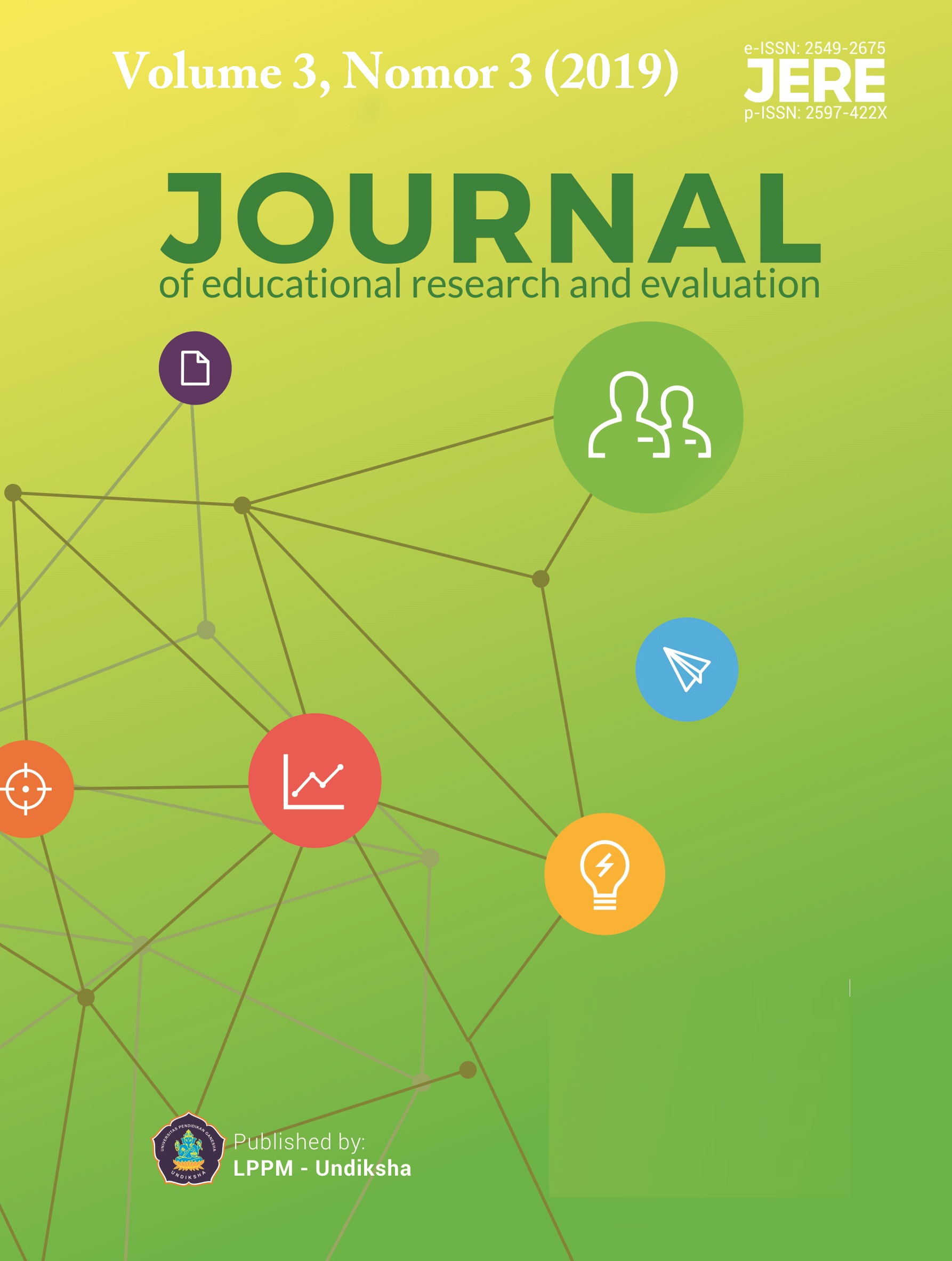The Effect of Learning Cycle Model Assisted by Self-Assessment on Students’ Writing Competency at EFL Students in SMP Saraswati 1 Denpasar
DOI:
https://doi.org/10.23887/jere.v3i3.21859Kata Kunci:
Learning cycle model assisted by self-assessment, Writing competencyAbstrak
This study aimed to investigate the implementation and the effect of learning cycle model assisted by self-assessment on the eighth grade students in SMP Saraswati 1 Denpasar in the academic year 2018/2019. The population was 294 students. The sample was 82 students selected by using a random sampling technique. This research used a mixed method design. The quantitative design used a posttest-only control group design and the qualitative design used descriptive qualitative design. The result of the t-test showed that the sig. (2 tailed) value was 0.000 ≤ 0,05. The mean score of the experimental group was 88.20 and the control group was 79.12. It can be concluded that writing competency of the experimental group was higher than the control group. This result was justified by the result of the observation checklist which showed that the implementation of learning cycle model assisted by self-assessment was very good.
Referensi
Cohen, L., & Cohen, L. (2018). 109Research design. In Research Methods in Education (pp. 109–284). https://doi.org/10.4324/9781315456539-47
Comert, M., & Kutlu, O. (2018). The Effect of Self-Assessment on Achievement in Writing in English. Journal of Educational Sciences Research, 8(1), 107–118. https://doi.org/10.22521/jesr.2018.81.4
Creswell, J. W. (2013). Research Design Qaulittive, Qantitative and Mixed Method Approach. In SAGE Publications, Inc (Vol. 91).
Crystal, D. (2003). English as a global language, second edition. In English as a Global Language, Second Edition. https://doi.org/10.1017/CBO9780511486999
Dirgeyasa, I. W. (2016). Genre-Based Approach: What and How to Teach and to Learn Writing. English Language Teaching, 9(9), 45. https://doi.org/10.5539/elt.v9n9p45
Grossman, J. H. (2009). Materialities of Writing. Novel: A Forum on Fiction, 39(1), 135–137. https://doi.org/10.1215/ddnov.039010135.
Hanuscin, D. L., & Lee, M. H. (2008). Using the learning cycle as a model for teaching the learning cycle to preservice elementary teachers. Journal of Elementary Science Education, 20(2), 51–66. https://doi.org/10.1007/bf03173670
Heritage, M., & Heritage, J. (2013). Teacher Questioning: The Epicenter of Instruction and Assessment. Applied Measurement in Education, 26(3), 176–190. https://doi.org/10.1080/08957347.2013.793190
Hyland, K. (2003). Genre-based pedagogies: A social response to process. Journal of Second Language Writing, 12(1), 17–29. https://doi.org/10.1016/S1060-3743(02)00124-8
Hyland, K. (2008). Genre and academic writing in the disciplines. Language Teaching, 41(4), 543–562. https://doi.org/10.1017/S0261444808005235
Langan, J. (2010). Exploring writing sentences and paragraph. In New York: Mc Graw Hill.
Marhaeni, A. A. I. N., Artini, P., Ratminingsih, M., Dewi, S., & Kusuma, I. (2017). Asesmen Autentik dalam Pembelajaran Bahasa Inggris. Sigaraja: PT. Rajagrafindo Persada.
Marhaeni, A. A. I. N., & Dantes, N. (2013). the Effect of Self-Assessmentand Self-Concept on Students’ Writing Competency At Eighth Grade of Mts Darul Aitam Jerowaruin Academic Year 2012/2013. 1.
Nezakatgoo, B. (2011). Portfolio as a Viable Alternative in Writing Assessment. Journal of Language Teaching and Research, 2(4). https://doi.org/10.4304/jltr.2.4.747-756.
Oshima, A., & Hogue, A. (1997). Introduction to Academic Writing: Second Edition. Agenda, 223. https://doi.org/10.1017/CBO9781107415324.004
Presiden RI. Peraturan pemerintah Republik Indonesia Nomor 19 tahun 2005 tentang standar nasional pendidikan. , Peraturan pemerintah Republik Indonesia (2005).
Qarareh, A. O. (2012). The Effect of Using the Learning Cycle Method in Teaching Science on the Educational Achievement of the Sixth Graders. 20–45. https://doi.org/10.1080./09751122.2012.11890035
Unduhan
Diterbitkan
Cara Mengutip
Terbitan
Bagian
Lisensi
Authors who publish with the Journal of Evaluation and Research in Education (JERE) agree to the following terms:
- Authors retain copyright and grant the journal the right of first publication with the work simultaneously licensed under a Creative Commons Attribution License (CC BY-SA 4.0) that allows others to share the work with an acknowledgment of the work's authorship and initial publication in this journal.
- Authors are able to enter into separate, additional contractual arrangements for the non-exclusive distribution of the journal's published version of the work (e.g., post it to an institutional repository or publish it in a book), with an acknowledgment of its initial publication in this journal.
- Authors are permitted and encouraged to post their work online (e.g., in institutional repositories or on their website) prior to and during the submission process, as it can lead to productive exchanges, as well as earlier and greater citation of published work. (See The Effect of Open Access)











